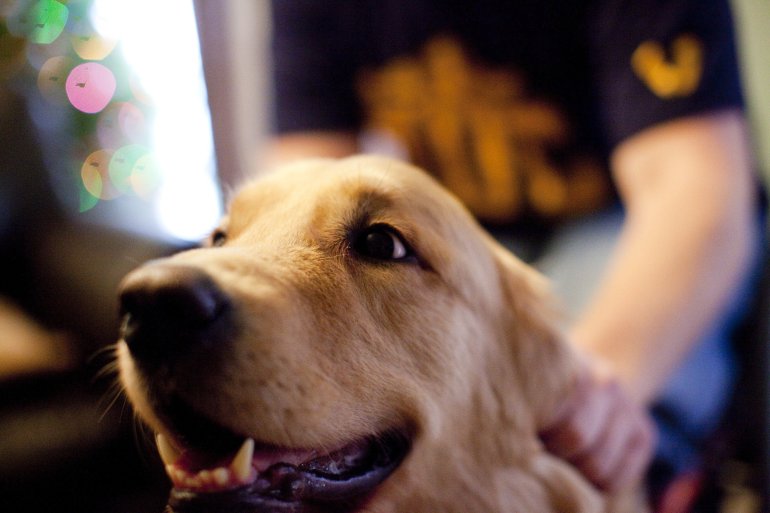
When an attack dog is sent in to take down a man in a padded suit, do you know what the dog’s handler does once the dog grabs a hold of the suit? The handler pets the dog and says repeatedly in an excited voice, “Good boy!” This is done to reinforce the aggressive behavior.
So if affection can be intentionally used to reinforce aggressive behavior, might it be possible to unintentionally use affection to reinforce aggressive behavior? (Or any unwanted behaviors, for that matter?) I think answer is absolutely. For example, let’s say a dog does a little bit of a nervous growl when it sees a stranger, and the owner tells the dog in a soothing and well-meaning tone, “It’s okay, boy. He’s not going to hurt you.”
Although the owner has good intentions, the dog does not know the owner is trying to be reassuring that the stranger is harmless. All the dogs knows is that the owner is petting and cooing him, so, in the dog’s mind, the owner clearly agrees with what he is doing (growling and being nervous). This is an example how many dogs are unintentionally conditioned to have a negative response to certain kinds of stimuli.
But just to make things clear, this post is not specifically about how affection can reinforce aggression; It is about how affection can reinforce bad behaviors in general. It’s about how affection, when used at the wrong time or when used excessively, can actually create for your dog more stress, anxiety, hyperactivity, and a lack of clarity (in the dog’s mind) of who the authoritative figure is.
You see, most dogs need a leader they feel has things under control. A leader they can trust. And when affection is given excessively, it often times gives the dog the impression that a particular person is just a “softy” who doesn’t enforce any rules, or otherwise just a “buddy” or “pal,” and not necessarily an authoritative figure. If you shower your dog with affection, don’t be surprised if your dog never takes you seriously when you give commands or try to enforce rules. And if you don’t necessarily shower your dog with affection, but you give it at the wrong moments, you may be unknowingly reinforcing unwanted behaviors.
Let’s say your dog wants your attention, so your dog starts whining, pawing at you, and nudging you., If you give in, you are reinforcing that pushy and demanding behavior. Likewise, if you attempt to sooth a dog that is displaying potentially dangerous/aggressive behavior towards another dog or person, you are reinforcing that behavior.
Also, another very common issue I see with dogs that have been coddled and cooed excessively is that these dogs often times develop separation anxiety. Yes, separation anxiety is (I believe) almost always created or exacerbated by the human. If we constantly shower our dogs with praise and affection, then our affection may become like an addiction to them. They can become so dependent and needy of us and our affection that they never learn how to deal with being away from us.
So the question that remains is when is it okay to give your dog affection? First, let me say that affection is an excellent tool for teaching your dog what you want, and it is also a necessary part of having a balanced relationship with your dog. But it is so important that we are careful about when and how much affection we give our dogs. As a general rule of thumb, never give your dog affection when your dog is in a clearly negative state of mind or practicing a behavior that is unwanted.
But perhaps more importantly when asking the affection question is to first recognize the state of the relationship between you and your dog. Is your dog calm and respectful towards you? Is your dog “bratty” and entitled? Does your dog demand affection or other things from you? Does your dog have separation anxiety or anxiety in general?
These are the questions we should ask to help us determine when and how much affection is appropriate. If you have a calm and respectful dog without any behavior or attitude issues, then it’s probably okay to be much more lenient and generous with affection. If you have a very stubborn and demanding dog that refuses to listen to you, I recommend implementing the “Nothing in Life is Free” approach. This means that a dog like this should earn affection through good behavior and compliance.
For a dog with separation anxiety, affection must also be given very sparingly. After all, affection is what a dog like this is hooked on. If we want a dog like this to learn how to be alone, giving too much affection and giving poorly timed/unearned affection will only hinder the dog from confident by itself.
These are very challenging questions that we should all be asking our selves about our dogs. And in know way am I writing this post to condemn giving dogs affection. I love giving dogs affection! But when we don’t take an honest look at the repercussions of misusing affection, we are bound to create issues with our dogs. This may be one of the most difficult concepts for dog owners to understand, but it is so important. If we really want what is best for our dogs, and not just what feels good to us, we must take an honest look at how affection might be affecting our dogs.
